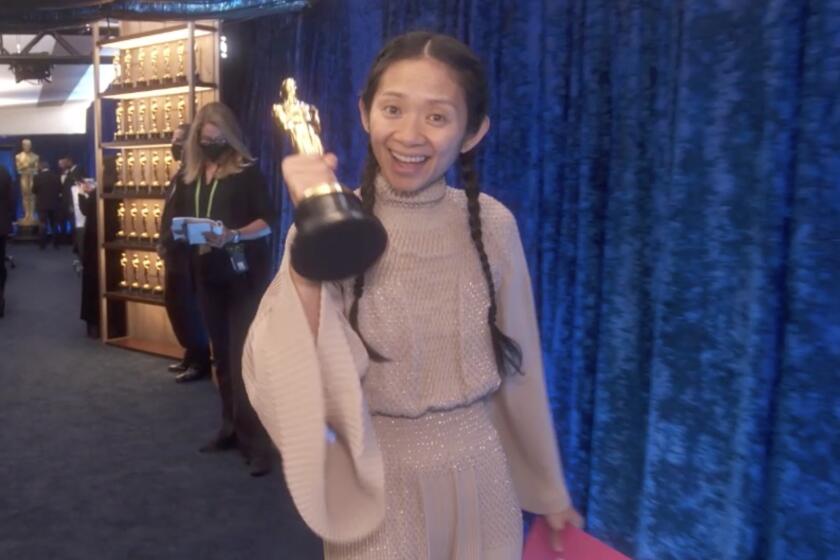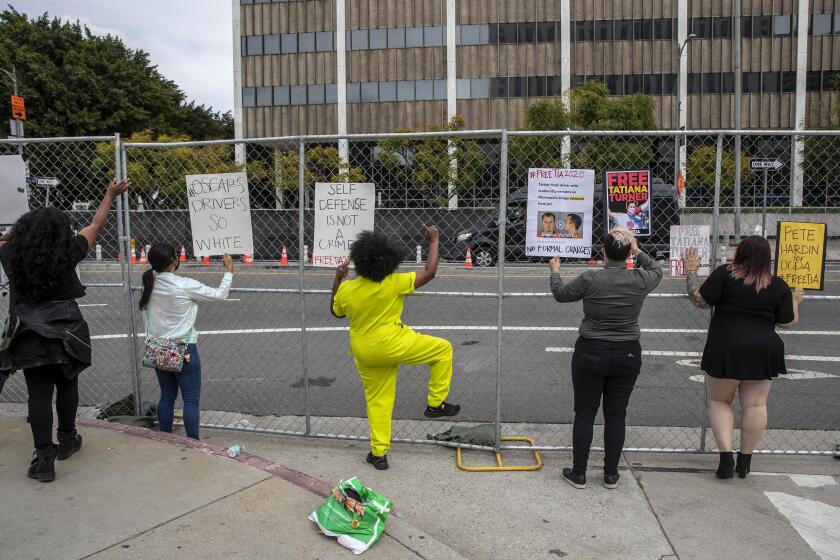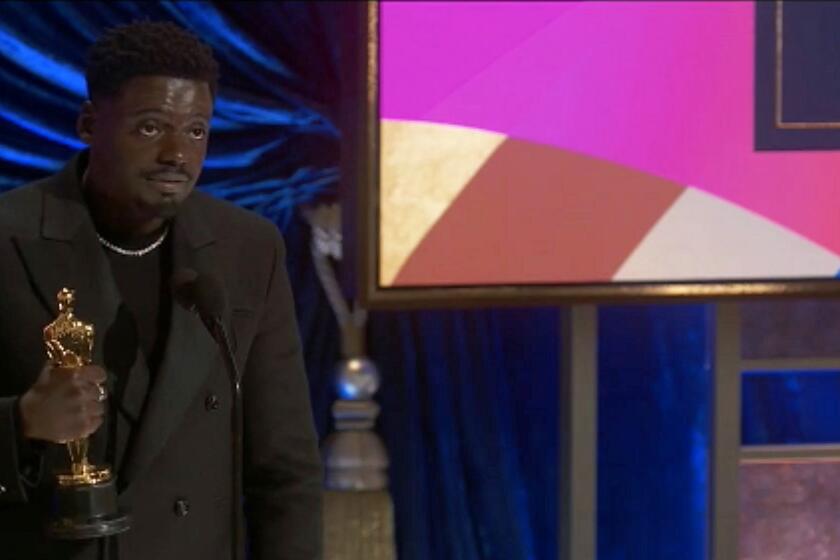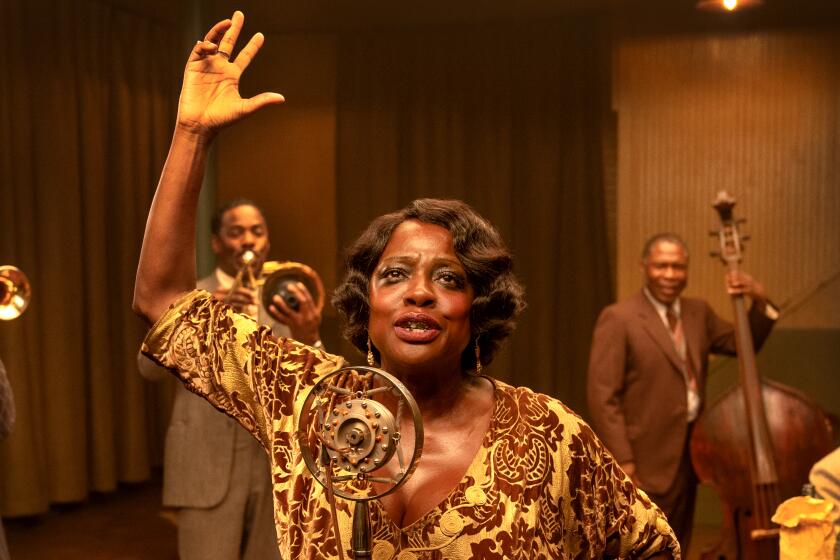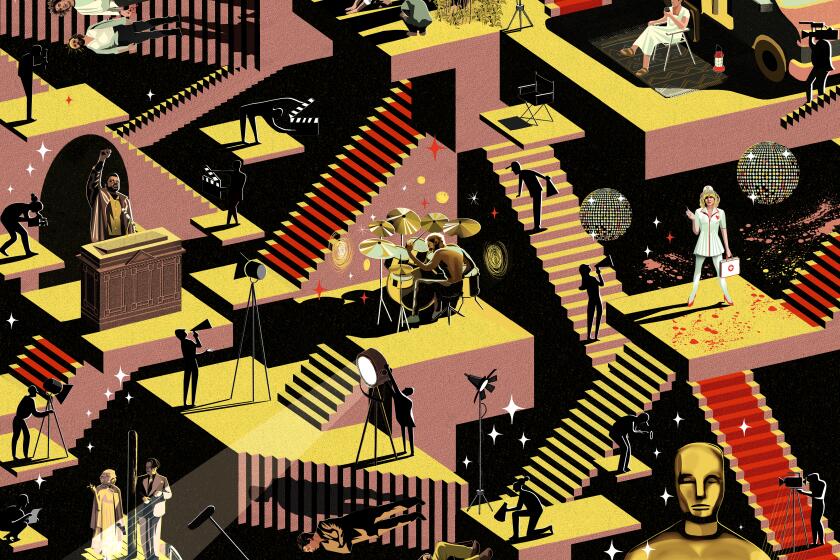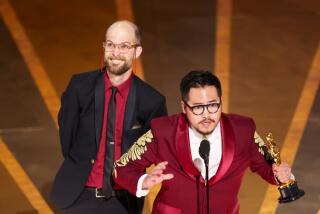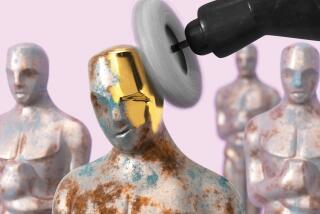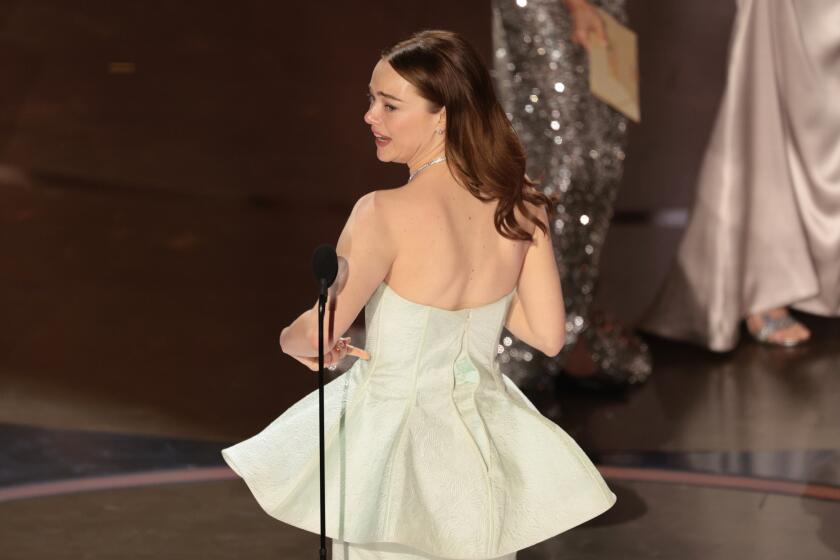Key Oscar takeaways: ‘Nomadland’ wins best picture as Hollywood looks to rebound from pandemic
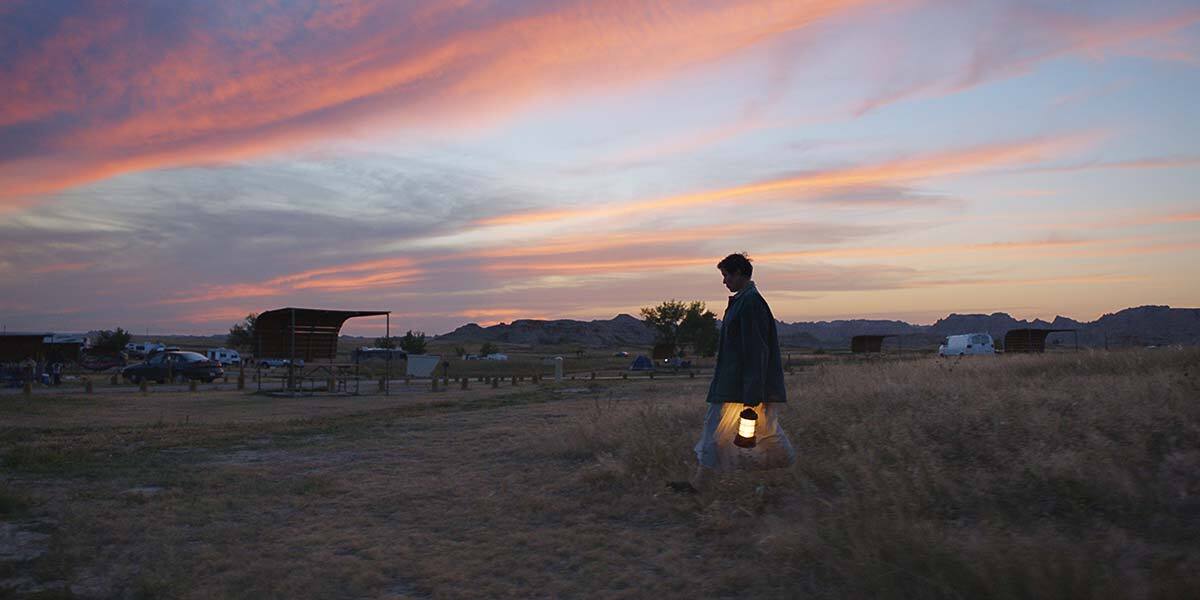
Capping a year that few in Hollywood will forget, much as they might want to, the 93rd Oscars ceremony Sunday night delivered an impassioned message that, while the movies may be down, they are far from out.
As expected, the motion picture academy gave the best picture prize to director Chloé Zhao’s “Nomadland,” a quietly poetic character study about economically displaced Americans. The film had earned acclaim since its debut at September’s Venice Film Festival, and its strong showing — which also included a historic win for Zhao, who became the first woman of color to win the directing prize — had been widely predicted.
“I have always found goodness in the people I met, everywhere I went in the world,” Zhao said, accepting the directing award. “This is for anyone who had the faith and the courage to hold on to the goodness in themselves and to hold on to the goodness in each other, no matter how difficult it is to do that.”
“Nomadland” takes home the best picture, director and lead actress awards at the 2021 Oscars.
A timely look at vulnerable older Americans trying to survive on the country’s margins, “Nomadland” prevailed over contenders that grappled with similarly weighty themes, including emotional dramas such as “Minari” and “The Father,” the Me Too-inflected thriller “Promising Young Woman” as well as politically charged period pieces such as “The Trial of the Chicago 7” and “Judas and the Black Messiah.”
Throughout this year’s protracted awards season — with the Oscars delayed from its original date of Feb. 28 due to the COVID-19 pandemic — “Nomadland” collected virtually every award in its path. From the Golden Globes to the Producers Guild Awards to the BAFTAs, at nearly every turn “Nomadland” fended off contenders such as the tender immigrant story “Minari” and the black-and-white portrait of screenwriter Herman Mankiewicz, “Mank,” which entered Oscars night leading the pack with 10 nominations but came away with just two wins, for production design and cinematography.
In an evening filled with heartfelt encomiums to the enduring power of cinema, the Oscars made a powerful, if at times slightly panicked, argument that movies are primed for a post-pandemic rebound. “The big screen is back,” the industry collectively declared in a pre-show segment spotlighting theater workers and teasing would-be blockbusters set for release later this year.
“This was indeed a hard year for everyone but our love of movies helped to get us through,” Regina King told the small crowd of attendees gathered at Union Station in Los Angeles in an opening that was far more muted than the razzle-dazzle of earlier shows. “It made us feel less isolated. It connected us when we were apart.”
Here are more key takeaways:
COVID-19 MAKES ITS IMPACT FELT
Though the show sought to shine a light on this year’s worthy nominees, the reality is, with movie theaters shut down for the past year, relatively few of them have been widely seen by audiences. With the pandemic continuing to upend life in Hollywood and around the world, it was perhaps inevitable that it would play a starring role, albeit an unwelcome one.
Given the difficulty of travel and the need for greater distancing, the telecast was held across multiple locations, including Union Station, the Dolby Theatre and via satellite hookups around the world. In planning the telecast, first-time producers Steven Soderbergh, Stacey Sher and Jesse Collins had insisted on a no-Zoom policy to preserve as much glamour and spontaneity as possible. The pre-show included an appearance by an epidemiologist, who vouched for the strict precautions that had been taken. (“I’m just happy to see people,” actor Lil Rel Howery said at one point.)
Union Station Oscars disrupt COVID tests and disabled people.
Instead of the usual spectacle of A-listers packed in a single starry room, the evening had a more intimate, cocktail party feel. With capacity at Union Station capped at 170 people, attendees — who were not required to wear masks while on camera — were whisked in and out throughout the show according to a carefully choreographed itinerary, like so many passengers catching a train.
Musical performances of the best song nominees were pre-recorded and aired during the pre-show, which doubled as a casual party to help nominees loosen up, free from the usual shrieking of fans on Hollywood Boulevard. But while the telecast creatively showed off the architectural beauty of Union Station, travelers attempting to navigate road closures around the busy travel hub were not so pleased, nor were Angelenos trying to find a COVID-19 testing site that had been relocated to the back of the station complex to accommodate the festivities.
DIVERSE WINNERS
As in recent years, issues of inclusion loomed over this awards season, with the Golden Globes engulfed in controversy following a Times investigation that revealed that the Hollywood Foreign Press Assn., which votes on the awards, has no Black members.
This year’s Oscar nominees were noteworthy for their diversity — “Minari” star Steven Yeun became the first Asian American ever to score a lead acting nod, among other firsts — and just five years after the academy was rocked by the #OscarsSoWhite controversy, the show notched some significant milestones on the road to greater inclusion.
Daniel Kaluuya, who won the Oscar for supporting actor, raised eyebrows with his acceptance speech. And his mother’s reaction was everything.
Along with Zhao’s landmark directing win, two out of the four acting races were won by actors of color. Daniel Kaluuya took home the supporting actor prize for his role as Black Panther leader Fred Hampton in “Judas and the Black Messiah” and Yuh-Jung Youn won the supporting actress prize for her turn as an eccentric grandmother in “Minari.”
Viola Davis and Chadwick Boseman had been considered strong contenders in the lead actor and actress category, but with both categories extremely competitive this year, the awards went to Frances McDormand for her role as Fern in “Nomadland” and Anthony Hopkins for his performance as an elderly man with dementia in “The Father.”
In an evening threaded with references to racial justice, Kaluuya urged the crowd to stay committed to the fight for equality.
“There’s so much work to do, guys, and that’s on everyone in this room — it ain’t no single-man job,” Kaluuya said. “So I’m going to get back to work Tuesday morning. Because tonight I’m going out.”
(In a less serious moment, Kaluuya made his mother — and perhaps mothers at home — gasp by marveling at the miracle of his very existence: “Like, my mom, my dad, they had sex — it’s amazing!”)
STREAMING DOMINATION
With moviegoing largely reduced for the past year to the living room couch, the academy altered its eligibility rules this year to enable films for the first time to qualify for Oscar consideration without a theatrical release. Not surprisingly, streaming services dominated the night.
For the second year in a row, Netflix — which is still in pursuit of its first best picture win — led the pack with 36 nominations, powered by “Mank,” “The Trial of the Chicago 7” and “Ma Rainey’s Black Bottom.” In the end, the streamer won seven.
The 93rd Academy Awards represented a strong night for Netflix, which, despite losing best picture to Disney-owned Searchlight’s “Nomadland,” won seven prizes.
Best picture winner “Nomadland” premiered on Hulu in addition to theaters; Disney+’s “Soul” won animated feature and original score; and Amazon’s “Sound of Metal” won awards for editing and sound. “Judas and the Black Messiah,” which won supporting actor and original song, premiered on HBO Max simultaneous with theaters. Even films including “Promising Young Woman,” “Minari” and “The Father,” which were initially released only in theaters, hit video on demand platforms soon thereafter.
Meanwhile, Warner Bros.’ “Tenet,” which had a much publicized exclusive theatrical release in September, picked up the Oscar for visual effects. That category was arguably the most impacted by the mass exodus of blockbuster-style films from the 2020 release schedule.
Although they were largely also-rans when it came to awards, the major studios were given a plum role in the night with promotional clips for upcoming potential Oscar contenders such as Steven Spielberg’s “West Side Story,” the adaptation of Lin-Manuel Miranda’s musical “In the Heights” and in-house DJ Questlove’s directorial debut, the documentary “Summer of Soul.”
A MORALE BOOST FOR HOLLYWOOD
There are few things Hollywood loves more than a comeback story. With multiplexes reopening after more than a year of being shuttered, the Oscars cast the industry itself as Rocky, knocked down but ready to get off the mat.
While last year’s Oscars took place just weeks before the pandemic shut down movie theaters, this year’s arrived as vaccines are going into millions of arms each day and multiplexes are reopening their doors. (The chains that have survived, that is. In a blow to the entire Los Angeles film community, the city’s beloved ArcLight theaters chain announced just days before Oscars voting that it was permanently closing.)
With its rallying tagline of “Bring Your Movie Love,” Sunday’s Oscars sought to reconnect movie fans emotionally with the communal experience they’ve missed for the past 14 months — and to give the industry a much-needed pep talk.
With a movie industry upended by the pandemic and growing pressures from streaming plus the push for diversity, the Oscars found meaning. But will the show find an audience?
Although the Oscars are routinely criticized for being stuck in their traditions, this year, with the ever-experimental filmmaker Soderbergh leading the charge, the show’s creative team used the restrictions of the pandemic as an opportunity to innovate.
As a sort of subliminal reminder of the power of cinema, the ceremony was shot like a film, at 24 frames per second and with a slightly wider screen format than is usually used in television, and the show kicked off with old-fashioned opening credits, with presenters billed like a cast. (In perhaps the most surprising break from tradition, the best picture award was not the final one given out but the third-to-last, with the two lead acting awards bringing the show to what the producers hoped would be a starry, emotional close. Alas, the gambit fizzled, with Hopkins a no-show for his upset win over the late Boseman, leaving the show limping to its finish.)
Throughout the show, presenters spoke in personal terms of the backgrounds of the nominees, repeatedly crediting the love of movies that had driven them from often humble beginnings to the pinnacle of achievement in film. Viewers learned, for example, that “Minari” writer-director Lee Isaac Chung started out producing educational films and still remembers seeing “E.T.” in a theater as a child, standing wide-eyed the entire time.
With viewership for earlier pandemic awards shows plummeting to historic lows, however, it remains to be seen how many tuned in to receive the message. After years of steadily declining viewership, this year’s Oscars come at a pivotal moment for the academy, with the long-awaited opening of the Academy Museum of Motion Pictures Arts and Sciences now just five months away. During the pre-show, the academy offered a preview of the museum, promising “an extraordinary destination for everyone who loves movies.”
Still, the Oscars argued that the movies themselves are not a museum piece but a vital art form with an exciting future ahead, pandemic or no pandemic.
“Please watch our movie on the largest screen possible,” McDormand said, accepting the best picture award for “Nomadland.” “And one day — very, very soon — take everyone you know into a theater, shoulder to shoulder, in that dark space, and watch every film that’s represented here tonight.”
More to Read
Only good movies
Get the Indie Focus newsletter, Mark Olsen's weekly guide to the world of cinema.
You may occasionally receive promotional content from the Los Angeles Times.
